

Wireless Internet Access: The Same Old Problem and the City’s New Agenda. Promise and Problems of E-Democracy: Challenges of Online Citizen Engagement. Citation Edit OECD, Promise and Problems of E-Democracy: Challenges of Online Citizen Engagement (Jan. 2004) (excerpts).
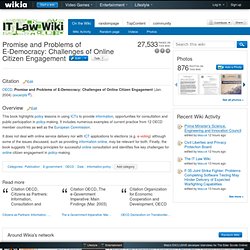
Overview This book highlights policy lessons in using ICTs to provide information, opportunities for consultation and public participation in policy-making. It includes numerous examples of current practice from 12 OECD member countries as well as the European Commission. South Korea. October 2012. Estonia ranking # 1!
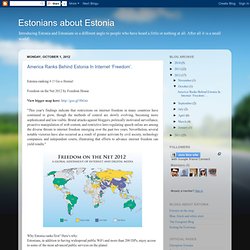
Go e-Stonia! Freedom on the Net 2012 by Freedom House. China cracks down on wi-fi in public spaces. China has ordered public spaces offering wi-fi web access to install costly software to enable police to identify people using the service, state media said Thursday.
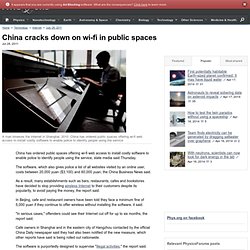
The software, which also gives police a list of all websites visited by an online user, costs between 20,000 yuan ($3,100) and 60,000 yuan, the China Business News said. As a result, many establishments such as bars, restaurants, cafes and bookstores have decided to stop providing wireless Internet to their customers despite its popularity, to avoid paying the money, the report said. In Beijing, cafe and restaurant owners have been told they face a minimum fine of 5,000 yuan if they continue to offer wireless without installing the software, it said.
"In serious cases," offenders could see their Internet cut off for up to six months, the report said. The software is purportedly designed to supervise "illegal activities," the report said. Russia to Restrict Access to Public Free WiFi. Mobile Apps. Fibre to the Third Place (FTT3P) The third place is a term used in the concept of community building to refer to social surroundings which are separate from the two normal social environments of our homes (first place) and the workplace (second place).

In his influential book The Great Good Place, Ray Oldenburg (1989, 1991) argues that third places are important for civil society, democracy, civic engagement, and establishing feelings of a sense of place. Oldenburg calls one’s “first place” the home and those that one lives with. The “second place” is the workplace — where people may actually spend most of their time. All About Cities » Turning off WIFI and plugging into cities. Cities are changing along with the role of the internet in our lives.
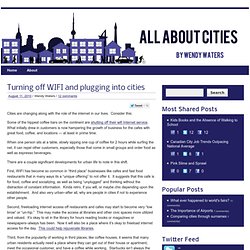
Consider this: Some of the hippest coffee bars on the continent are shutting off their wifi Internet service. What initially drew in customers is now hampering the growth of business for the cafes with great food, coffee, and locations — at least in prime time. Responsible Digital Citizenship by Missy Feller on Prezi. How Cyber-Safe Is Your City? CYBERSPACE, 2010 (D.O.T.) - You probably won't be mugged in smaller cities like Portland, Ore., but you're more likely to have your cyber-wallet picked.

Those same factors that are likely to boost a city's civic pride -- prevalence of Wi-Fi hot spots, a cyber-savvy populace and so on -- also make citizens more likely to be at risk for cybercrime, according to a recent study. The data comes from Symantec's Security Response group, which in conjunction with research firm Sperling's BestPlaces has issued a list of the 10 riskiest online cities. In the study, the company compared the number of cyberattacks against several potential risk factors, including the prevalence and speed of Internet access, usage, how much citizens spend on computer gear, and how likely they are to shop online.
Regardless of the size of the city, score high on those marks and the crooks will find you. Cybercrime isn't made up of anonymous, blanket attacks any more. 1. Wi-Fi Hotspot Security - What You Need to Know Before You Connect to a Wi-Fi Hotspot. Many people don't think twice about logging onto Starbuck's free wi-fi or using their hotel's wireless network when traveling, but the truth is, although public wi-fi hotspots like these are very convenient, they also carry a lot of risk.
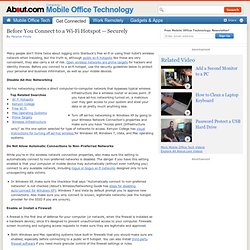
Open wireless networks are prime targets for hackers and identity thieves. Before you connect to a wi-fi hotspot, use the security guidelines below to protect your personal and business information, as well as your mobile devices. Disable Ad-Hoc Networking Ad-hoc networking creates a direct computer-to-computer network that bypasses typical wireless infrastructure like a wireless router or access point. If you have ad-hoc networking turned on, a malicious user may gain access to your system and steal your data or do pretty much anything else. Do Not Allow Automatic Connections to Non-Preferred Networks While you're in the wireless network connection properties, also make sure the setting to automatically connect to non-preferred networks is disabled. ITRC Public WiFi usage Survey Results. It is common these days to have access to the Internet wherever you go.
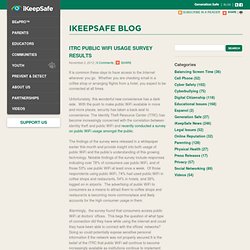
Whether you are checking email in a coffee shop or arranging flights from a hotel, you expect to be connected at all times. Unfortunately, this wonderful new convenience has a dark side. With the push to make public WiFi available in more and more places, security has taken a back seat to convenience.
The Identity Theft Resource Center (ITRC) has become increasingly concerned with the correlation between identity theft and public WiFi and recently conducted a survey on public WiFi usage amongst the public. The findings of the survey were released in a whitepaper earlier this month and provide insight into both usage of public WiFi and the public’s understanding of this growing technology.
Cyber Security - Laptops Vulnerable To Public WiFi.